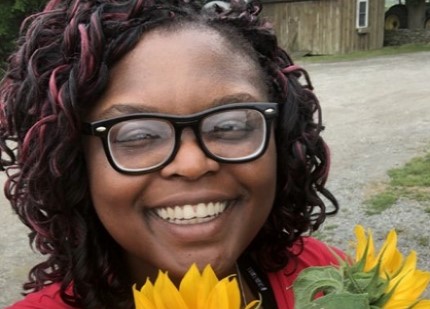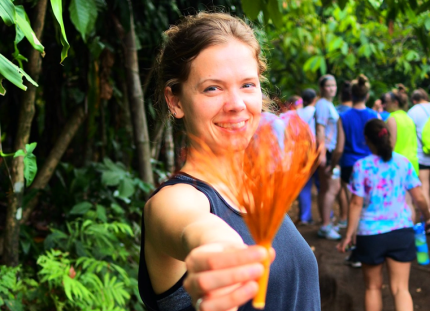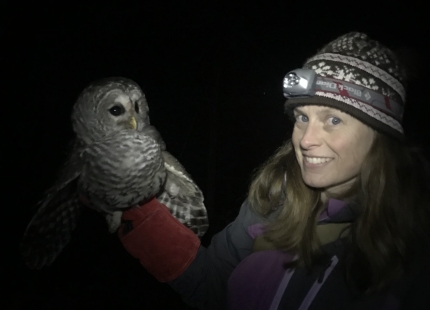Biology
Build a Great Life with the Science of Life
-
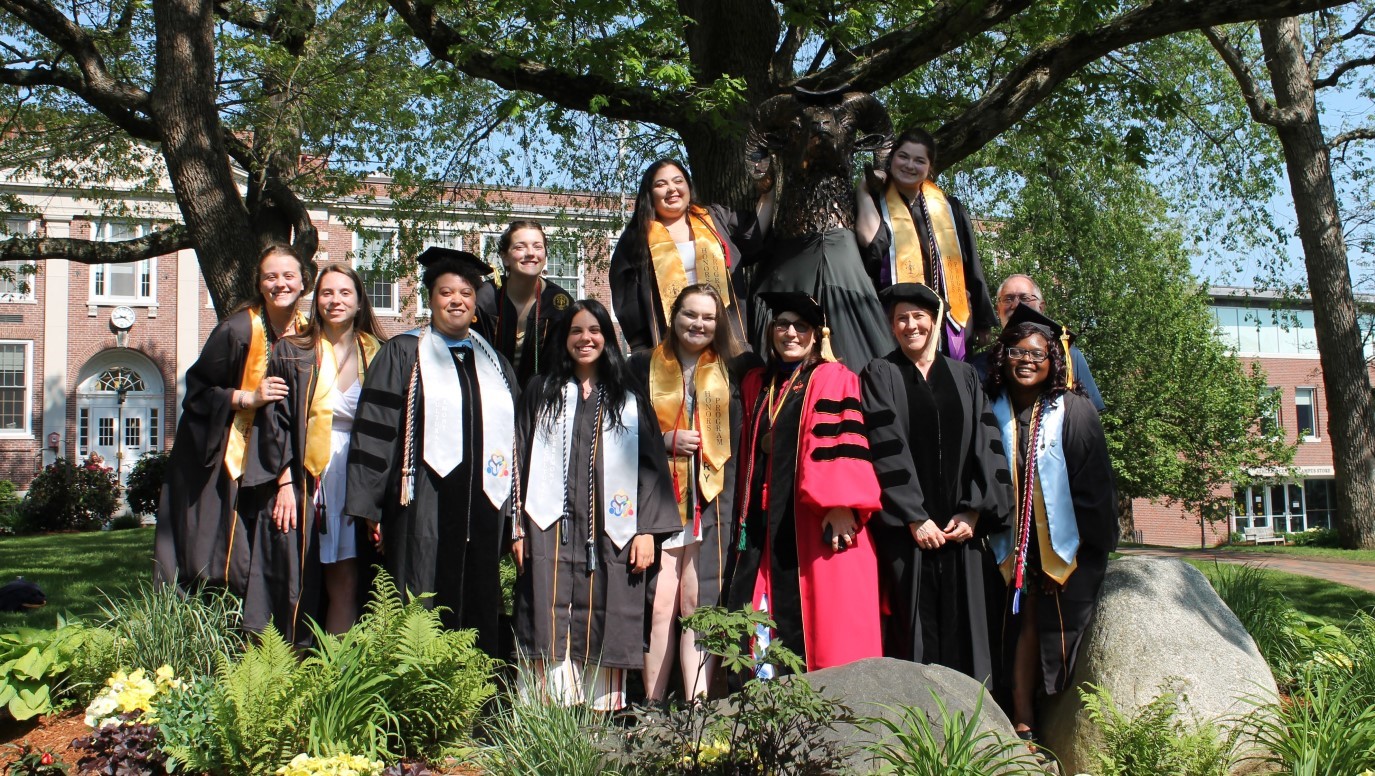
Some 2022 Biology graduates with (l to r) Drs. Cara Pina, Aline Davis, Amy Knapp, and Rick Beckwitt
-
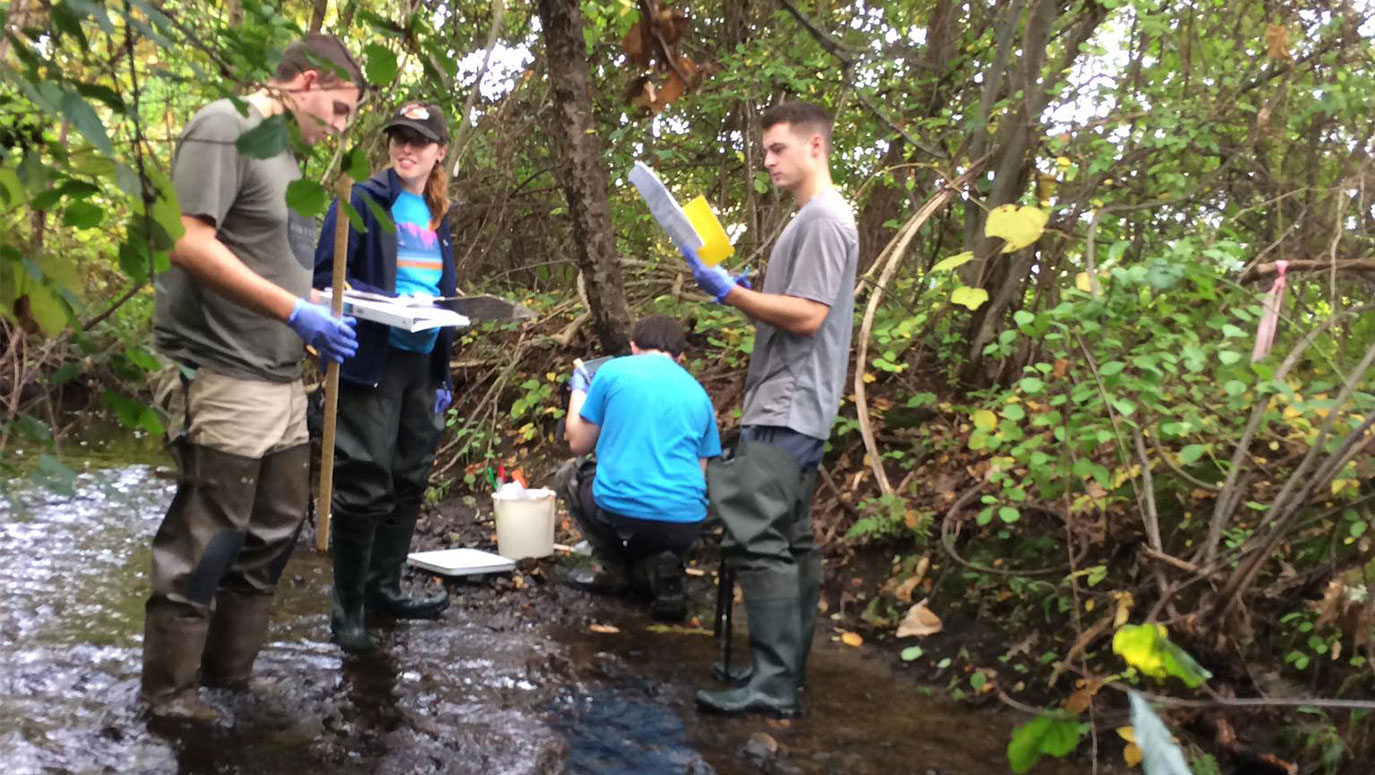
Ecology students collecting water quality data out at Baiting Brook
-
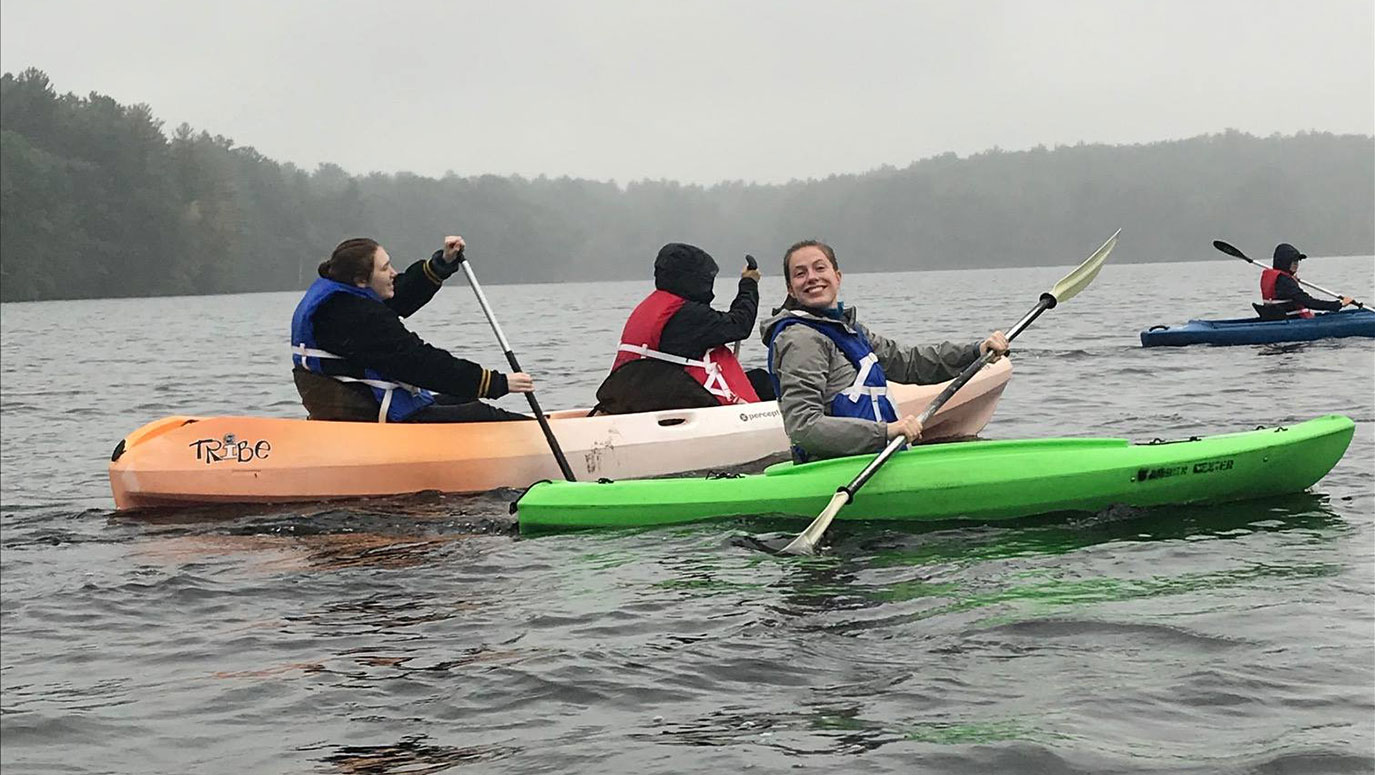
Vascular Plant Taxonomy students kayaking in the fog on the Ashland Reservoir
-
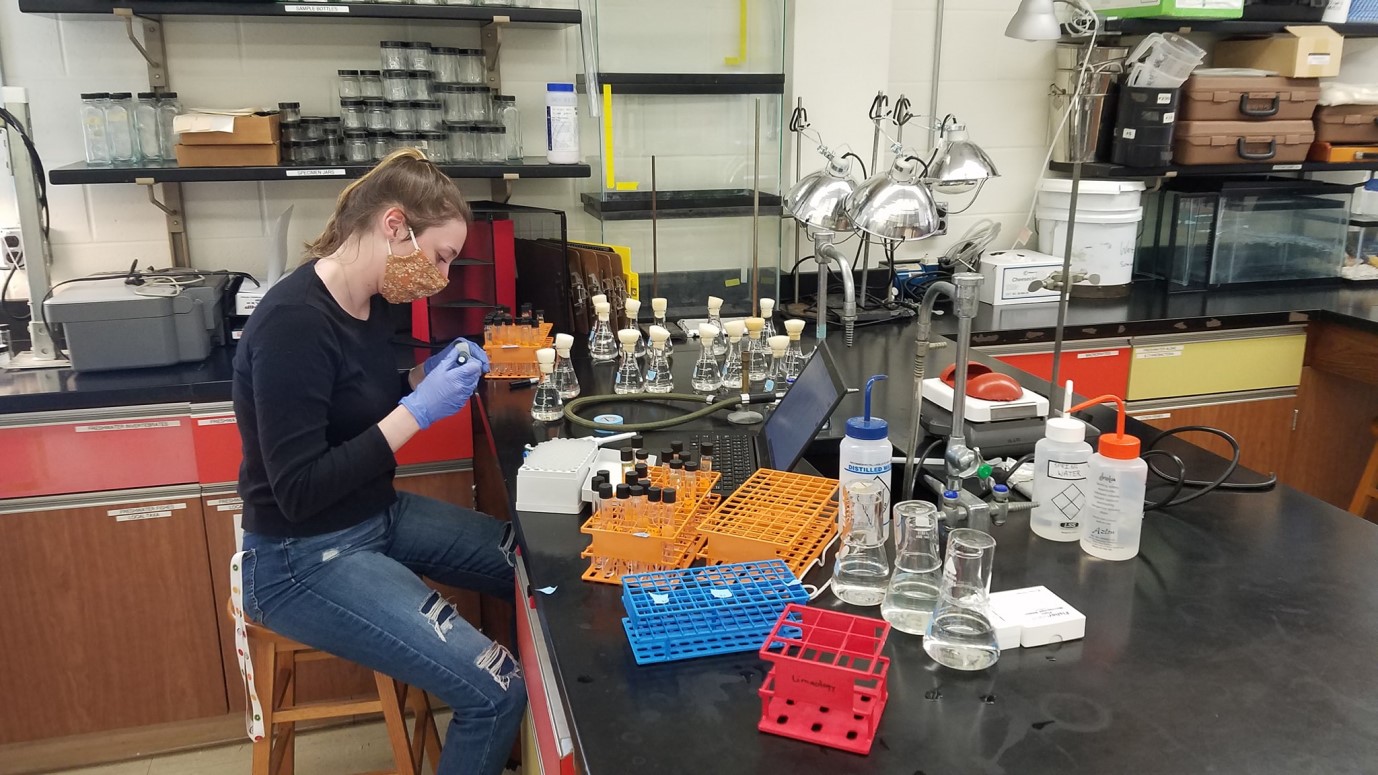
A student preparing cyanobacteria variants for a growth rate versus temperature experiment
PROGRAM MISSION STATEMENT
The mission of the Biology Department at Framingham State University is to provide a cost effective, comprehensive undergraduate education in the life sciences to a diverse student population. Within the context of an anti-racist liberal arts curriculum, we emphasize experiential learning to prepare students for employment in areas including research, technical applications, teaching, and the pursuit of advanced degrees in biology or health-related professional schools. Located between Boston and Worcester with accessible transit, we are able to connect our students to local and regional opportunities to prepare for a variety of careers in biology. Students may participate in laboratory exercises, field experiences, and collaboration with faculty in biological research. Our graduates act as effective leaders and contributors in biologically related discussions and efforts, be they with academic, government, corporate, or public groups.
BACHELOR OF SCIENCE IN BIOLOGY
Framingham State’s BS degree in Biology provides excellent preparation for a wide variety of career paths in the health professions, biotechnology, wildlife conservation, industry, research, and education. Our diverse curriculum includes courses in organismal biology, human and animal physiology, cell and molecular biology, genetics, neuroscience, ecology, wildlife biology, botany, and marine biology.
Every Biology major selects a concentration according to their interests and career goals. The five concentrations offered are General Biology (UBIG), Wildlife and Environmental Biology (UBIW), Biotechnology (UBIO), Biology Secondary Education (UBIT), and Pre-Health Biology (UBIP). See the Program links at the bottom of this page for specific Biology core and concentration requirements.
In addition to regular course work, every Biology major participates in an intensive capstone research program. Through first-hand experience students come to understand the scientific process and appreciate the complexity and diversity of biological systems. The program also gives the students invaluable training in scientific writing, data analysis, and oral presentation skills.
Program Learning Objectives
1. Explain how the basic principles of the biological hierarchy (molecular, cellular, organismal, population, communal, ecological, and global) are interconnected.
2. Differentiate diverse organismal characteristics by their causal evolutionary mechanism.
3. Investigate a hypothesis relevant to their concentration by using the scientific process.
4. Demonstrate the ability to communicate biological information and deliver it in a form appropriate for the target audience.
5. Use a biological perspective as a foundation for civic engagement in discussion of contemporary policy, including anti-racism, public health, and climate change.
Lab Safety
Lab instruction involves the handling of chemicals and materials that present certain safety risks. Framingham State University is committed to ensuring the health and well-being of all University employees, students, and visitors. In regard to lab safety specifically, the University is legally obligated to follow the provisions of the "Lab Standard" regulation of the federal Occupational Safety and Health Administration.
The goal of the Lab Standard is to ensure that all lab personnel are informed as to the chemical and other safety hazards present in the lab setting, and that appropriate work practices and equipment are in place to keep lab personnel safe. A critical element of the Lab Standard is the preparation of a Chemical Hygiene Plan (CHP) that spells out expected lab conduct, standard operating procedures, personal protective equipment, lab safety equipment, emergency procedures, etc. Click on the link for the full text of the University's CHP.
RELATED PROGRAM OPTIONS
Teacher Certification for High School Biology
Biology majors have the option of pursuing a career teaching high school biology. Framingham State offers two pathways to biology teacher certification. One is an Education minor coordinated with the Biology major. The other is a post-baccalaureate licensure program. For more information please visit the Biology Teacher Certification page.
Pre-Health Studies Program
The Pre-Health Studies Program, jointly run by the Biology Department and the Chemistry & Food Science Department, provides career-specific course guidance to students in any major who are interested in pursuing a medical, dental, pharmacy, veterinary, or other health-related career. Students in the Program also have the opportunity to apply to the Health Professions Advisory Committee for a composite letter of recommendation. Please visit the Pre-Health Studies Program page for more information.
BS/PSM 4+1 Program for BS in Biology to PSM in Biotechnology
Biology majors planning a career in biotechnology or the biopharmaceutical industry may elect to combine their BS in Biology with the Professional Science Master’s (PSM) degree in Biotechnology - Quality Assurance. This 4+1 program prepares graduates to enter the job market with both scientific expertise and management skills for long-term career growth and success. Interested students should apply in the fall of their junior year. Please visit the BS/PSM 4+1 Program page for more information.
Neuroscience Minor
The Neuroscience minor is cosponsored by the Biology Department and the Department of Psychology and Philosophy. Neuroscientists study the structure and function of the nervous system, the thoughts, emotions, and behaviors that it manifests, and mental disease and treatment. Students interested in a minor in Neuroscience should meet with the Chair of one of the sponsoring departments. The minor consists of four required courses and one elective. Only one course may be taken within the student's major area. Courses in the minor may also fulfill general education requirements. For detailed course information see the Program link below.
Public Health Minor
Biology majors planning to pursue a career in the health field might consider declaring a minor in Public Health. No more than two required courses from major requirements may count towards minor. Courses in the minor may be used to fulfill general education requirements. To complete the course residency requirement for a minor, a minimum of three course-credits (12 semester hours) in the minor must be taken at Framingham State University. Interested students must apply in writing to the Chair of the Food and Nutrition Department. For full details on course requirements check Public Health Minor program information.
Science Communication Minor
Biology majors who are considering a career in a science writing, editing, publishing, or broadcasting may elect to declare a Science Communication minor, an interdisciplinary minor offered by the English Department. To declare a Science Communication minor, students must complete the appropriate form and obtain the department Chair's signature from one of the following departments: Communication, Media, & Performance; English; or Environment, Society, & Sustainability. The minor consists of five courses, three required plus two electives. Four of the five courses must be taken outside the major department. Students should meet with an advisor in the minor to design a course plan. See Program link below for detailed course information.
BIOLOGY FOR NON-MAJORS
The Biology minor may be elected by non-Biology majors when biology course work would complement the major program. Of the five courses required, at least two must have a laboratory and three must be 200-level or higher biology courses. All courses must be chosen under the guidance of a member of the Biology Department. See Program link below.
For non-science majors the Department offers several general education courses on a variety of topics including human biology, marine organisms, plants, and the environment.
Spotlight on Biology
Aspiring neuroscientist and community leader
Hillary came to FSU from Mt. Wachusett Community College and quickly became an active member of the community. She was a supplemental instructor, peer mentor, and a member of the student government. She also served as the student member of the FSU Board of Trustees. Hillary completed two research internships, one at Tufts and one at UMASS Chan Medical School. After graduation Hillary will begin graduate school to earn a doctorate in Neuroscience.
A nursing career in public health
After graduation from FSU Rachael earned a Master of Public Health degree and an RN. She worked as a COVID pandemic first responder in NYC for two years. Then she became a traveling nurse, providing medical assistance to populations and health care facilities in need. Rachael is currently with the Indian Health Service in Bethel, Alaska, working as an ER nurse and supporting mobile clinics in rural villages. The hospital serves 58 villages in an area the size of Oregon. She continues to work virtually with the Dominican Women's Development Center in Manhattan.
Ornithologist in the field
Dr. Brandi Van Roo contributes to national conservation efforts to monitor owls during their fall migrations. Each year several students join her in the evenings to catch the smallest owls in the east: northern saw-whet owls, which are about the size of a robin. Students learn how to safely extract birds from mist nets, collect measurements of wing length and body mass, and identify molt patterns in order to determine the age and sex of captured individuals. The owls are then banded with a federally issued numbered band so their movements can be tracked if they are recaptured on another night, in another state, or even in a future year. On the night shown above, however, everyone was treated to a surprise in the net: a much larger barred owl.




